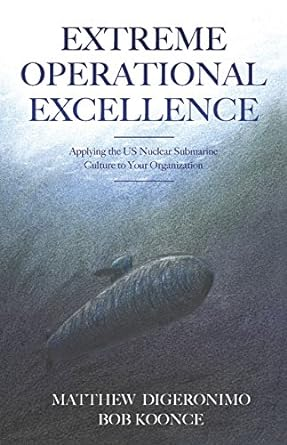I finally have a book that describes my management philosophy. Two retired US Navy Submariners Officers describe how the core principles of the Submarine Service are the perfect model for excellence in the business world too.
Extreme Operational Excellence: Applying the US Nuclear Submarine Culture to Your Organization is one of the best books I have ever read. If you want to understand me and the way I work, read this book.
If you want to understand how to REALLY accomplish organizational excellence, read this book.
If you want to understand why US Submariners are the way they are, read this book.
Just read this book!

Some Thoughts
“Operational excellence is a CULTURE (emphasis mine) fully devoted to professional knowledge, brutally honest self-assessment, continuous improvement, and intellectual integrity.”
Wow. Yes. If you know me at all and pause and remember the blog post I wrote in 2020 “SRE 123” you will see some similarities. The whole SRE ideal is all about blameless culture, constant measurement and learning, and asking why. It’s really not surprising that I took to SRE principles so easily. It’s how I was trained! My early professional years were in the US Navy as a nuclear reactor Electronics Technician (ET), Reactor Operator (RO) and then Engineering Watch Supervisor (EWS). I qualified in submarines and earned the right to wear the submarine special warfare insignia we lovingly call “dolphins.” My sub was among the best of the best, earning multiple “Battle E” awards for excellence as well as the very rare Navy Unit Citation and extremely rare Presidential Unit Citation. I had the absolute best mentorship in the best environment to really learn how to have operational excellence.
You really should read the book but I teased this nugget out that describes the essence of what must exist:
- people put truth above ego and perception
- you have processes that enforce unwavering standards
- integrity
The reality is that “excellence” CAN be somewhat situational dependent. If you are selling ice cream from a popsicle stand you don’t need the same rigor as you do on a nuclear sub. The principles hold, but the processes can be much easier.
One incredibly interesting part that resonated with me was the observation that a new leaders first job is to evaluate how the pendulum of operational excellence is swinging. Is it getting better or worse? More importantly, does management agree with that assessment? The authors point out that when that happens then that friction has to be resolved before anything else.
Something I am pondering as I look back over my career in high tech is that I didn’t know that lesson yet. Some of the positions I have had did not have a consistent and agreed upon view of what “excellence” looks like. There can also be large mis-matches in how much “quality” different leaders think different functions need. Looking back, I can see that some leaders I had friction with thought we could let some functions/products/areas slide with minimal attention/budget/expectations - perhaps becauase they thought those things were not vital to the business.
I haven’t decided how I feel about that yet.
Questioning Attitude
The book has some excellent case studies out of regular non-high-tech business. One in particular struck me about a company that changed a water treatment chemical and despite signs that it was failing at every stage of the process no one thought to ask “is this unusual thing I’m seeing because we made a change? Why is it different?” This kind of thinking is critical in any business or operation. In that example case it cost the company millions of dollars.
One quote in the book really struck me: “A questioning attitude is a skill.” Damn. I’d not really thought of it that way. I’m now super motivated to add some training in my current company about HOW to question, HOW to develop a perspective where one is always asking “why is that?” The book has some great observations about some of the cultural things that have to exist to allow folks to have a questioning attitude.
And now we are back at that word: Culture
Culture has been described as “the worst behaviors that leadership are willing to tolerate.” Having been at some companies where that was the case I can mostly agree. But culture is also, to a large degree, the mind set of the group and what they are willing to tolerate - and what they aspire to. How they want to work and think and collaborate. I do think you can grow a better culture from the middle of a company. It is so much harder to do if the top leaders oppose you, of course. But I don’t think you need cultural change to be initiatied from the C-Suite. We can all lead from whatever role we have. But for lasting company-wide change it needs C-Suite to lead the way.
Conclusion
Read this book. I can promise you will learn things and you will think about excellence in a very different way. I am indebted to the authors for putting in writing all the core values that were instilled in me - that I had not realized I was using still today. Now I can say “you want to know my leadership style? It’s patterned on this book.” Becase that’s the world I was trained in. Once upon a time, in a galaxy far far away. It’s been long enough that I feel that way!
Enjoy!
